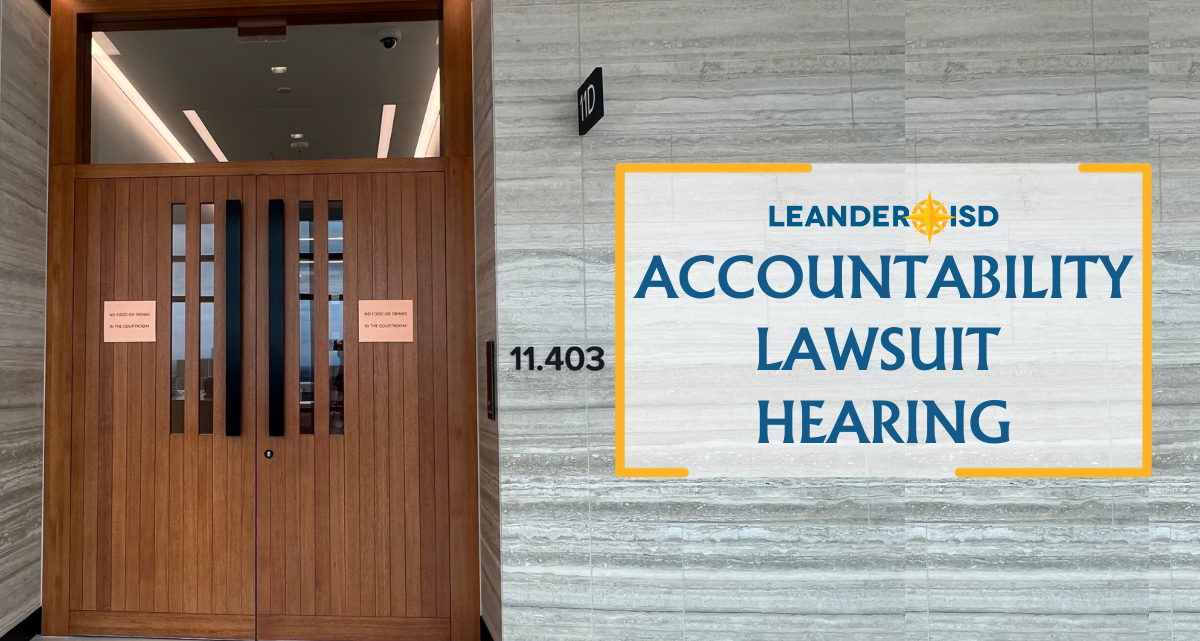Leander ISD Superintendent Bruce Gearing, Ed.D., testified in a Travis County courtroom Tuesday in a hearing regarding revisions to the state’s A-F accountability system.
In September, LISD joined more than 100 school districts in a lawsuit filed against the Texas Education Agency and Education Commissioner Mike Morath. Among the top issues is the release of school accountability scores for both districts and campuses after massive changes were made to accountability formulas as well as the state’s standardized test, the State of Texas Assessment of Academic Readiness (STAAR).
Despite plans to release methods, measures and procedures used to evaluate schools for the last and current school year, the TEA and commissioner have yet to do so. Gearing’s testimony focused on how the absence of guidance has created a ripple effect.
“Our community entrusted us with significant accountability indicators and standards that include, but are not limited to, state accountability indicators that measure our system through the community-based accountability system (CBAS),” Gearing said. “We are not able to communicate the full accountability picture to our community because the state has failed to complete their responsibility under statute to inform districts of the measures schools will be held accountable to for the 2022-2023 school year.
“When the commissioner breaks trust by not telling us what we need to do ahead of time, we break trust with our campuses, our teachers and our families,” he added. “In a fast-growth, high-performing school district like ours, this lack of direction creates problems that influence the choices people make. It affects enrollment, the value of homes, and the health of the community. It degrades trust.”
The rating system gauges student academic proficiency, progress, graduation rates and post-graduate placement. Test scores, graduation rates and other relevant data the state measures contribute to annual A-F grades. The state releases letter ratings publicly to parents and the wider community. In 2022, Leander ISD earned a “B”.
Superintendents from Kingsville, Spring Branch and Waco ISDs also testified Tuesday before Judge Catherine Mauzy of Travis County 419th District Court in a civil courtroom filled with school district and TEA administrators, as well as members of the media. Additional witness statements highlighted the absence of a baseline year for managing expectations regarding student outcomes.
Twice, when TEA transitioned the state standardized test from Texas Assessment of Academic Skills (TAAS) to Texas Assessment of Knowledge and Skills (TAKS) in 2003 and in 2012 when TAKS became STAAR, TEA provided a year-long break from issuing A-F ratings, for school districts to gather baseline data and understand the new system.
“Every time we have had a major change, we have worked in a trust-and-inspire environment where we collaborated on the revisions,” Gearing said. “We have asked for a phase-in year while we work through this complicated system, and the commissioner has repeatedly denied our requests. The current environment feels more like command-and-control leadership, which while efficient, lacks effectiveness.”
In 2019, LISD began its endeavor to create a Community-Based Accountability System (CBAS) measuring performance indicators created by district students, parents, teachers and staff. While STAAR test results and state accountability are part of CBAS, they are not the only benchmarks. Now, in its second year of implementation, the district released its findings in the 2022-23 CBAS report.
While TEA held several meetings with school districts about what the new formula for accountability ratings will look like, in September the commissioner announced a further delay in releasing final rules for the accountability manual and the issuance of the 2023 accountability ratings.
Judge Mauzy is expected to make a ruling on the temporary injunction no later than Oct. 23.



